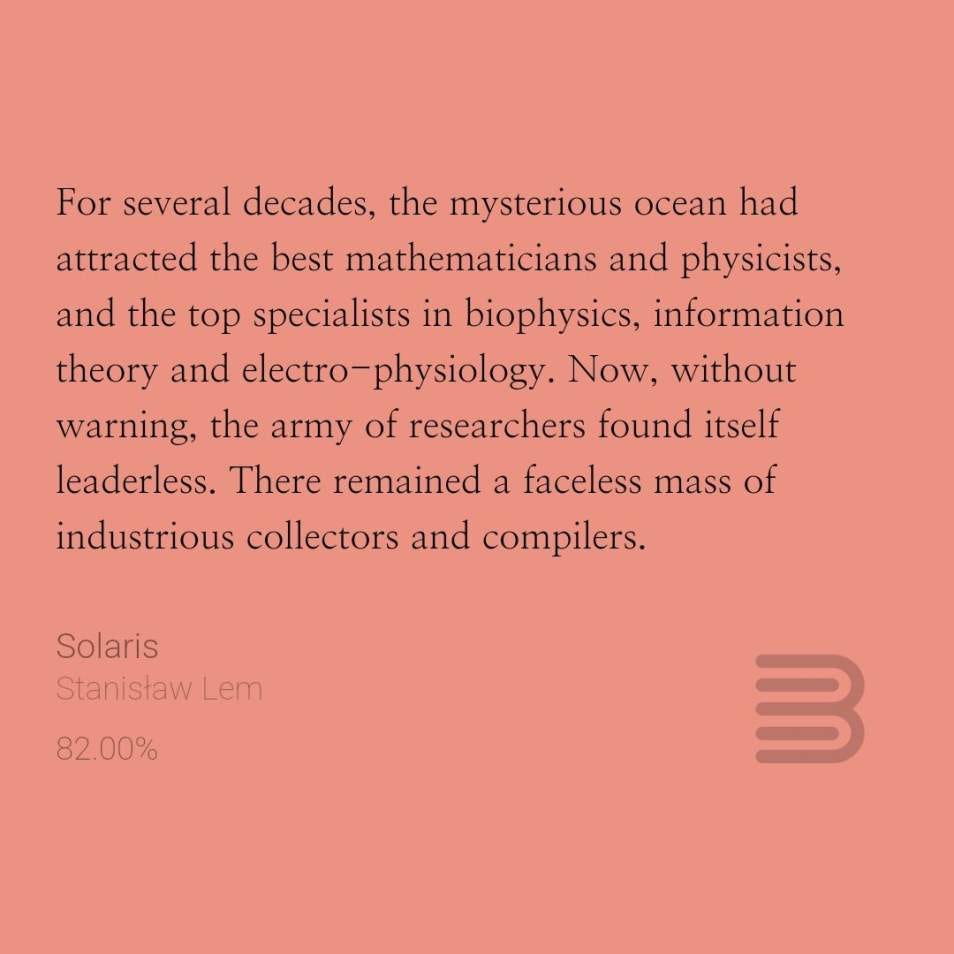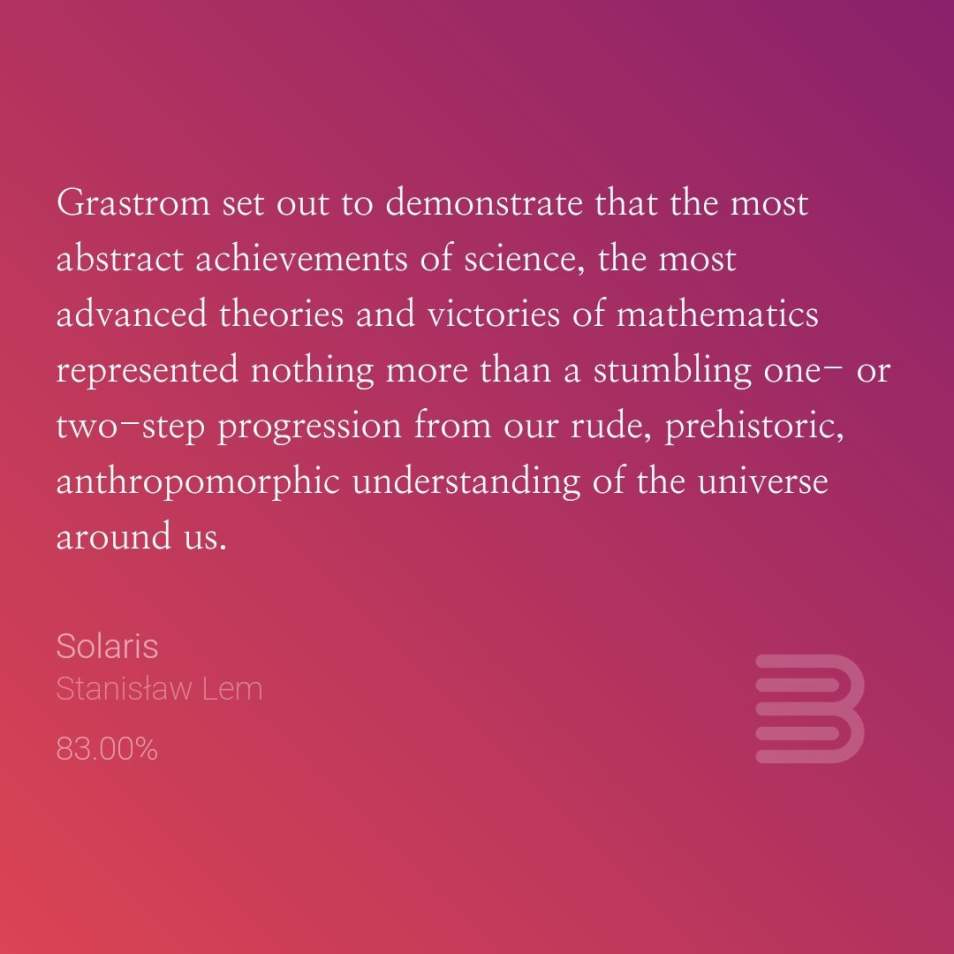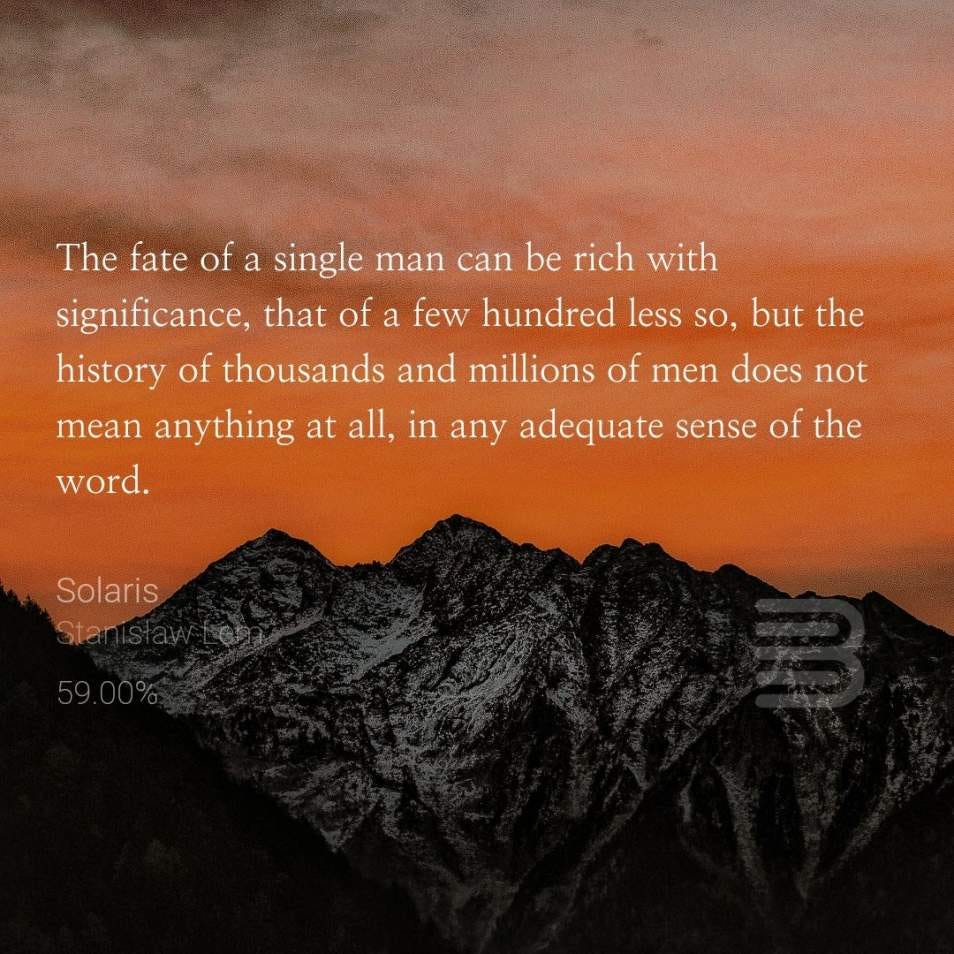by Ritobrata Ghosh
I just finished reading Solaris by Stanislaw Lem. It is definitely one of the classics that are worth reading now. Here I outline my thoughts on that book.
I.
Stanislaw Lem successfully created a future version of the earth. This is a kind of story that has what I call vague realism. There are many stories in the genre of SciFi and Fantasy where there are many intricate rules and the interactions of rules. These rules are the brainchild of the author, and they let readers speculate and validate, create fan theories, find plot holes, and so on.
Think about Harry Potter, and ASOIF series. There are intricate rules and interplays of them. Many pages have been filled with them. Much ink have flowed to create and describe them.
You don’t have that luxury in a 200-page book. Yet you run the risk of creating a non-convincing world. A world that falls apart way too easily. It risks of not surviving a scrutiny afforded by half-a-glance.
Lem is a master writer and expert world-creator. His world, although not painstakingly, drily described and defined, survives even a serious scrutiny.
He talks about humanity reaching many planets, he talks about space exploration. But he doesn’t put concrete numbers, or goes on to describe “quadrants” or “sectors” of space. He doesn’t go on to classify spaceship classes, either.
Yet after all these kinds of supposed “omissions”, the world doesn’t feel empty or vague. It is concrete. Real.
It also possibly shows my maturing as a reader. Before, I probably would have preferred having all the details laid out first, then the story. But not any more. Now, the story is more important to me- painstakingly detailed world-description be damned.
II.
One of the aspects of this novel is very real. It is the one involving itself with the deterioration of Science.
In the beginning of real-world Science, we had original thinkers. People with quirks. They weren’t afraid to express themselves, and put forward crazy theories.
Nowadays Science is a monoculture. Being and belonging to a certain type is expected. Quirks get you practically banished from the community.
There is a lack of frighteningly original thinkers. One kind of culture reigns. There are only certain kinds of ideas, Science being done in extremely largely-funded laboratories, it has lost its personal-charishmatic charm.
One of the reasons is that low-hanging fruits of Science have already been plucked, processed, and poured. But that is not the only reason.
Before, Science was an activity of the elite white-clad philosophers, autistic “Gentlemen”, and the mad lovers. Great Scientists self-selected themselves. Nowadays, there is a process.
You need to be a certain kind of student- consistent all through your life, then have a well-defined college life, then belong to certain class and cabal of academics, then you get to do Science.
Isaac Newton believed in Solomon’s Temple’s mythical and magical importance in scientific knowledge, Wolfgang Pauli believed in telepathy, Ramanujan received his formulas from Devi Namagiri in dreams.
Nowadays, they don’t exist. They are not allowed to exist.
Quirk has disappeared from Science, and so has quirky, wildly original thinkers in Science.
The field of “Solaristics” also suffer the same fate. First there were original thinkers and original theories. Then, they ceased to exist. The field was dominated by less original men and women.
III.
The book has one common aspect- where man faces himself. This has become widely discovered to the point of being a cliche. This has been an aspect of literary works across genres.
The planet chooses to establish contact by making copies of human-construct of a person, or a desire, or thoughts and wants.
These copies have superhuman biology- or rather a sophisticated physics underlying that biology. But that’s not important.
It forces men to face themselves. Their deepest corners of heart have to be reached, touched, understood in order to make sense of things, or to barely survive.
Gibarian, the Scientist who died before Kelvin reaches Solaris, had a large breasted, topless black woman as a visitor. We never get to see any other visitors than Kelvin’s. Their visitors must comprise thoughts or histories or parts of themselves they don’t want anybody else to see.
Isn’t this just like the real life, since forever?
We, you and I, carry desires, fears, and parts of ourselves with us. Always. Yet we never let others see them. We move and dance and dazzle in plain sight. Yet we never even think about exposing our deepest corners to others. Just like the two Scientists other than Kelvin never reveal a thing about their visitors.
And, it is not limited to the copies. The planet itself, with all its turns and twists, colors and structures, and above all- with its unexplainable nature displayed in all its glory, pronounced on full display- forces many kinds of men to face very deep existential questions.
There are people who like to think they have complete understanding of all interactions, all things happening in nature- even after introducing and calculating for uncertainty and randomness.
What happens when such people face a planet that can neutralize the chaos of being in a three-body gravitational cluster that shows totally, completely, fully inexplicable behaviour? Doesn’t your world model get thrown out the window?
What do you do? What are you capable of doing? What can you do? These are among many questions you have to face, once you give Solaris a proper look.
Yet again, Solaris proxies the real world.
You have to start facing yourself. Your whole existence. Your soul.
IV.
“Man” is of two kinds- the individual and the collective. Wild reactions not only stem from the individual, but also the collective.
Reactions are varied, of course. And definitely with variance in degree.
Some are just delighted.
God has been “dead” for centuries- in many senses. Mythology, religion, and anything else that provided men with awe, sense of belonging, purpose in life, a holy inexplicable- have long been conceding ground to certainty, explanations, “Science”. Results have been mixed, to put it mildly. Humans are afraid, anxious, sans a sense of belonging, a divine purpose.
But people allegedly like to be amazed, have something unexplained in front of them- so they can have something mystical, mythical and bigger than themselves, their limited reasoning power, and beyond the limits of their sense organs.
Solaris fills the gap.
To many people, Solaris is the mythical, it is the mystical, it is God.
V.
Horror can be jump scares. Or it can be creepy.
It takes an advanced author to create a new kind of horror. There is exactly that in Solaris.
Humanity is much more advanced in the time of the novel. It can travel far and wide. It can travel quickly. It has advanced rocketry. What can you be afraid of in this situation?
Well, you can create scary aliens with their graphic gore and murderous attitude. Then that task of scaring the reader becomes easy for the author.
Lem doesn’t take the shortcut, for good reasons. Yet the story makes you afraid. It is scary.
You are in a sealed, controlled environment. There is no sign of any traditional life anywhere on the planet. Anybody “else” isn’t supposed to be there. But when you find out exactly that, you are afraid. You are faced with a primal fear that transcends and overtakes ghosts or monsters or murderous aliens.
You find footsteps and human forms roaming about where they don’t have any business being. This fear is far more deep than the traditional kind.
You are dealing with an ocean that can undo the chaos of a three-body problem. Many find it intelligent. Many don’t. It has never communicated with you. You are not sure it is capable of understanding or communicating with you. And yet, through no understandable means, the planet has killed hundreds of men. It doesn’t try, it doesn’t talk… then you hear footsteps, you face colleagues who are hiding something significant from you, you see a large black woman moving topless in the station…
Where does it end? Where does it take you?
This kind of horror that creeps you out because you cannot point a finger towards it was created and used by Lem. I loved it.
VI.
Despite being so far in the future, and having an intelligent ocean, the novel still manages to be realistic.
There is nothing in the novel that is out-of-place, implausible, or amusingly bad.
How the author manages to do that, is a legit mystery.
There are no suddenly-introduced concepts that change the course of the story, or there are not anything that seem inconsistent with the already established world or Science.
When new facts are introduced, they fall right into the established structure. Not a bit seems out-of-place.
VII.
When it comes to SciFi, the future becomes an important part of it. How the author envisions the future is a very interesting aspect of a SciFi novel.
Armed with the advantage of being alive 63 years after the novel was released, you the reader are in a good place to judge how well the author saw the future.
First thing I have to say about that is- if the publication year were hidden from you, you could not place the novel written before the 1980s. The fact that it was written two decades before even that is astonishing. Not many particular technologies come to mind, but everything as a whole falls into the right place.
One particular technology that does come to the mind is video meetings. Just four years ago the whole world was on video calls. Video meetings are the bread and butter of our lives.
In the novel, video meetings are ubiquitous because the situation demands it. And with the ease Lem introduced the concept and embedded it into the story was really wonderful.
Although he didn’t envision software-enabled camera disabling. His characters have to physically cover the camera to be in an “in-circuit” voice call.
Lem also envisioned the library of the future being fully on microfilms. Not on computers, tablets, or something else.
But, the story doesn’t focus too much on the gadgets and gizmos of the future, but use them minimally without any weight added to the story.
VIII.
He stares openly, unafraid, disillusioned, calmly into the distance of the ocean…
I was first recommended the book on Hacker News- the startup news aggregator and social forum run by Y Combinator. The posts there are not fully about startups or business. It has much more focus on technology and “hacking” (see “The Word Hacker” by Paul Graham).
This book also has many instances of hacking.
The scientists were able to conduct experiments with X-Ray where there were no simple ready-made provisions for the same. They also manage to create a vaporizer that wasted the visitors.
But the one instance that I liked the most was Kelvin rabbit-holing on neutrino Physics. He was not a Physicist, but was nonetheless an intelligent person, a scientist, and someone chosen to be an astronaut for a mission to Solaris.
He goes down the rabbit hole of neutrino Physics, and understands enough after spending some serious amount of time to delay the creation of the vaporizer.
This is what the hacker mentality is about. This is also the kind of article that I like to see on HN.
IX.
“The machinery of Solaristics fell into disrepair, and rusted over with hypotheses differentiated only in minor details, and unanimous in their concentration on the theme of the ocean’s degeneration, regression and introversion.”
Something I have noticed among fellow scientists/engineers- most are in these field for the prestige and/or the money. Very few care deeply about the field. Not deeply enough to care about the lores and legends. Not deeply enough to contexualize every discovery and invention embedded in the grand timeline.
People who don’t these, I am not sure that they will make great scientists. They will make okay scientists that perpetuate what already is there. They won’t be ground-shaking creators of paradigm-changing theories. At least that’s what I think.
That’s what happened with the study of Solaris. The ones that came latter, doesn’t care that much about the history, the lores, the stories concerning Solaris. Solaristic is but a “career” to them. Not more.
This has stagnated progress. The early pioneers cared about every aspecct of the planet. But the ones in the time of the novel don’t.
Gibarian was an exception. Despite being a stalwart of his field, he found time to learn about and read accounts, reports, theories that aren’t considered to be serious Science by the mainstream of Solaristics.
This gives rise to a warm feeling in my heart. I am not a great scientist, but I always cared about the lores, the lives, and the legends of Science.
The existence of all these literature, pigeonholed with junk sciences, being read and discussed and taken seriously make me nostalgic.
X.
There’s something that I felt was missing from Lem’s treatment of Science regarding Solaristics. But it isn’t his fault.
There were intricate details about many possible theories for explaining Solaris and its ocean, but not anything akin to chaos theory. It is because chaos theory, complexity as a field rose a decade or two after Solaris was published.
It’s very interesting to speculate how Lem would have treated the ocean in a state where he is enlightened by chaos theory. What kind of theories would he embed in the opinions of scientists in the novel, and what kinds of connections would he draw from complexity and chaos theory to intelligence and being- are nice things to think about.
XI.
Kelvin decided to stay.
He fell in love with the visitor despite fully knowing that she wasn’t his wife, his love that he knew. And she, after discovering her true nature, decided to end her own existence.
Kelvin feels many things. He thinks it to be not very important to decipher things anymore. Not to go back to earth. He isn’t any closer than anybody in deciphiring “the truth” either.
He doesn’t try. He doesn’t hope. Yet, he maybe has some kind of faith.
Not trying to understand, not trying to analyze, not trying to gain victory over it. He just is. There.
Isn’t it what we with our lives? Isn’t this what we ought to?










